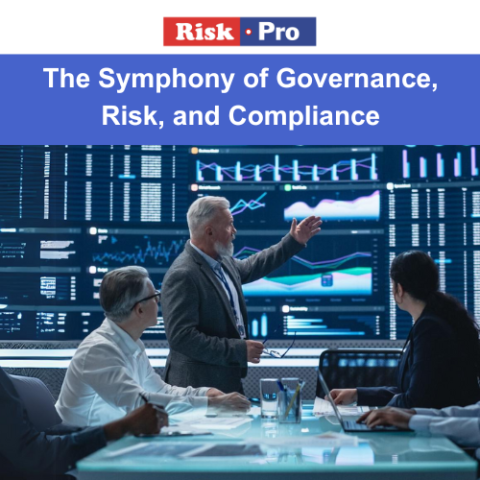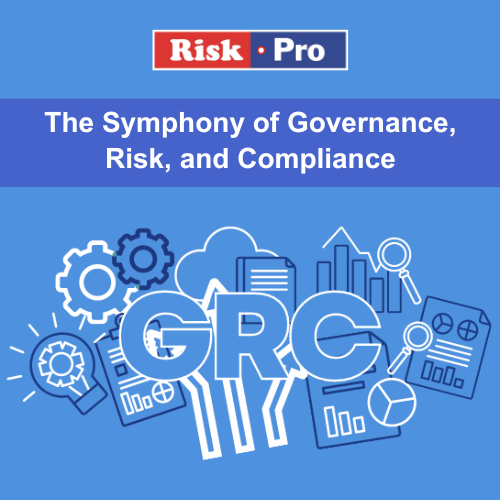
In today's ever-evolving business landscape, the intricacies of governance, risk, and compliance (GRC) play a pivotal role in shaping organizational success. GRC has become indispensable components for organizations striving to achieve sustainability and resilience. These three pillars form the cornerstone of effective management, providing the framework necessary for sustainable growth and resilience in the face of uncertainty.
The Foundations of Organisational Governance.
At the heart of every well-managed organization lies a robust governance structure. Governance encompasses the policies, procedures, and practices that guide decision-making processes and ensure accountability at all levels. It establishes clear lines of authority and responsibility, fostering transparency and trust among stakeholders. Effective governance sets the tone for ethical conduct and promotes a culture of integrity within the organization.
Navigating Risk: A Strategic Imperative for Business Success
In the pursuit of organizational objectives, businesses are constantly exposed to various risks that can jeopardize their success. Risk management is the proactive process of identifying, assessing, and mitigating these risks to minimize their potential impact. By understanding the inherent uncertainties and vulnerabilities within their operations, organizations can make informed decisions and allocate resources strategically. Embracing a risk-aware culture empowers businesses to anticipate and adapt to changing market conditions, thereby enhancing their resilience and competitiveness.
Compliance Imperative: Upholding Trust in a Regulated World
Compliance with legal and regulatory requirements is non-negotiable for any business operating in today's highly regulated environment. Failure to adhere to applicable laws and standards can result in severe consequences, including financial penalties, reputational damage, and even legal sanctions. Compliance management involves staying abreast of evolving regulations, implementing internal controls, and conducting regular audits to ensure adherence to prescribed norms. By fostering a culture of compliance, organizations demonstrate their commitment to ethical conduct and uphold the trust of stakeholders.

Integrated Approach to GRC: While governance, risk, and compliance are distinct components, they are inherently interconnected and mutually reinforcing. An integrated approach to GRC enables organizations to harmonize these elements and leverage synergies across functional areas. By aligning governance objectives with risk management strategies and compliance requirements, organizations can achieve greater efficiency, effectiveness, and agility in their operations. Integrated GRC frameworks facilitate holistic decision-making, enabling organizations to balance risk-taking with regulatory compliance and strategic objectives.
Enterprise Risk Management (ERM): Within the realm of GRC, enterprise risk management (ERM) emerges as a comprehensive framework for addressing risks holistically across the organization. ERM transcends traditional silos and encompasses strategic, operational, financial, and compliance-related risks within a unified framework. By adopting ERM strategies, organizations can identify emerging risks, assess their potential impact, and develop proactive mitigation plans. ERM fosters a culture of risk awareness and resilience, empowering organizations to navigate uncertainty with confidence and seize opportunities for growth.
GRC Solutions and Technologies: As the complexity of business operations continues to escalate, organizations are increasingly turning to GRC solutions and technologies to streamline their processes and enhance their capabilities. GRC software platforms offer integrated functionalities for governance, risk management, and compliance, providing real-time visibility into organizational performance and risk exposure. These solutions automate routine tasks, facilitate data-driven decision-making, and enhance collaboration across departments. From risk assessment and mitigation to regulatory reporting and audit management, GRC technologies empower organizations to proactively manage their GRC initiatives and drive continuous improvement.
GRC Best Practices and Consulting: Achieving excellence in GRC requires a strategic approach and adherence to best practices tailored to the organization's unique needs and objectives. Engaging GRC consulting services can provide valuable insights, expertise, and guidance in designing and implementing effective GRC frameworks. From conducting GRC assessments to developing tailored strategies and roadmaps, consultants can help organizations optimize their GRC initiatives and align them with business priorities. By leveraging industry benchmarks and proven methodologies, organizations can enhance their GRC maturity and resilience, positioning themselves for long-term success.
In addition to adopting an integrated approach to GRC, organizations must cultivate a culture of continuous improvement and innovation. By embracing emerging technologies, such as artificial intelligence and machine learning, businesses can enhance their risk assessment capabilities, automate compliance monitoring, and gain valuable insights into evolving threats and opportunities.
Conclusion - GRC encompasses a comprehensive approach to managing governance, risk, and compliance activities within organizations. By integrating governance, risk, and compliance initiatives, organizations can enhance transparency, improve decision-making, and mitigate risks effectively. Through strategic GRC implementation, organizations can achieve resilience, sustainability, and long-term success in today's complex business environment. To know more contact us at info@riskpro.in
